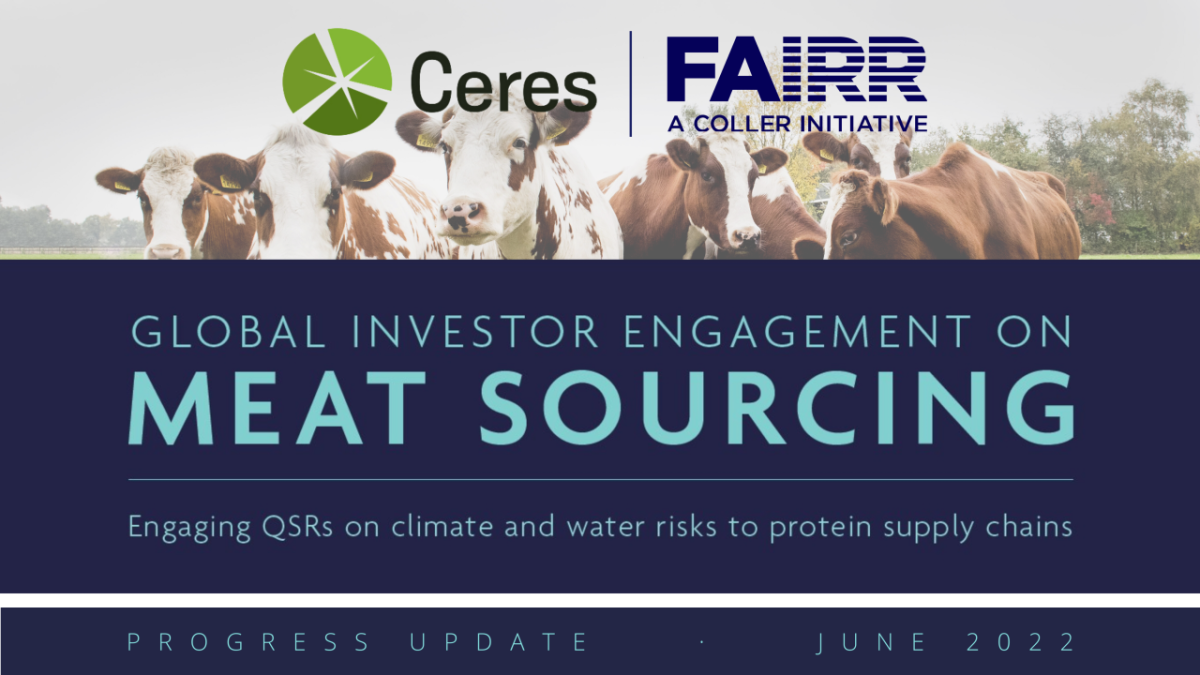Six Fast-Food Giants Commit to Science-Based Targets, but Challenges Remain

- Initial progress in setting GHG reduction targets: All six fast-food companies engaged by the $11 trillion global investor coalition have now set, or committed to set, global greenhouse gas reduction targets approved by the Science-Based Targets initiative (SBTi).
- More needed to address water risks: None of the fast-food restaurants has set targets to reduce water pollution or consumption across their supply chain and all are failing to mitigate risks posed by water stress.
- Lack of supplier transparency and action: Target-setting has not yet resulted in adequate action by meat and dairy suppliers. Only two firms (RBI, Yum!) report the proportion of emissions arising from suppliers of animal agriculture products. In both cases, these represent more than 50% of the firms’ entire emissions.
June 14, 2022 /3BL Media/ - A three-year global investor engagement with fast-food giants has resulted in significant progress on climate target-setting but has raised concerns for investors about the management of both emissions and water usage in the supply chain, according to a new progress report published today by the global investor network, the FAIRR Initiative, and the sustainability organisation, Ceres.
Led by an $11-trillion investor coalition, the Global Investor Engagement on Meat Sourcing focused on six leading fast-food companies with a combined market cap of more than $281 billion: Chipotle Mexican Grill, Domino’s Pizza, McDonald’s,Restaurant Brands International (owners of Burger King), Wendy’s Co. and Yum! Brands (owners of KFC, Pizza Hut and Taco Bell). The coalition, which includes over 90 investors, urged companies to de-risk their meat and dairy supply chains by setting ambitious targets to reduce greenhouse gas emissions while reducing water usage and their impacts on water quality.
The report reveals that all six fast-food companies have now publicly set, or committed to set, science-based targets approved by the Science Based Targets initiative (SBTi)*. Chipotle has committed to reducing scope 1, 2 and 3 emissions by 50% by 2030.
The report also shows that well over 90% of these companies’ emissions come from scope 3 emissions where suppliers of meat and dairy products are a key concern and play a significant role. However, only two of the six firms, RBI and Yum!, disclosed total emissions derived from animal agriculture. Both companies listed meat and dairy suppliers as responsible for more than half (57% and 51% respectively) of their total emissions. Investors warn this lack of transparency in the animal agriculture supply chain could undermine the efforts of food brands to tackle climate risk.
Cristina Figaredo, Senior Manager, Research & Engagement at FAIRR, said:
“Regulators and influential frameworks such as the Science-Based Targets Initiative (SBTi) are tightening requirements for the food sector to report and act on climate. So, investors are very concerned that ambitious climate targets by fast food companies are not translating into action along the supply chain.
“The lack of alignment of supplier policies with corporate climate ambitions risks undermining the efforts of these high-street brands to tackle climate risk. Their performance on water is also alarmingly poor, and efforts to mitigate risks related to water scarcity and pollution have stagnated over the past year.”
Addressing risks to the global water supply
None of the fast-food firms has set enterprise-level targets to reduce water pollution and consumption across their supply chains**. This is despite the food industry ranking as the largest driver by far of water consumption, water pollution, and other water-related impacts globally. While some companies, including Wendy’s, McDonald’s and Yum!, have begun setting targets to address water impacts in their operations, investors continue to stress that they are failing to address larger risks within the agricultural supply chain. This is especially important because the agricultural supply chain makes up the bulk of companies’ water footprint. Domino’s 2020 materiality assessment found that the production of ingredients accounted for 88% of its overall water consumption.
Currently, RBI has not disclosed any efforts to analyse water risks in their operations, while McDonald’s is the only company that has conducted a comprehensive water risk assessment that includes its supply chain. This means five of the six companies may be unaware of how much water is being drawn from areas of high water stress and resulting water scarcity risks.
Daniel Shepard, Senior Associate of Investor Engagement, Water at Ceres, said:
“When investors come together to move companies to act on climate and water risks, we see the power of capital markets to accelerate the shift to a more just, sustainable economy. While there is much more to do, the results of this engagement show that we are making progress.
“The time is now for companies to double down on their commitments and demonstrate real impact. We are particularly focused on advancing better water risk management in supply chains, an often overlooked, but equally important, side of the climate change coin.”
John Anzani, LAPFF Executive Committee Member, said:
“For many years, fast food companies have been laggards when it came to acting on climate risk, so we are pleased to see that all six of these fast-food giants have now committed to Science-Based Targets – an increase from just two in 2020.
“However, progress on water, a key impact in this sector is lagging. We will be working with other investors to help capital markets properly value water and manage water impacts across industries.”
Masaru Okubo, Senior Stewardship Officer at Sumitomo Mitsui Trust Asset Management, said:
“It is imperative that companies implement strong policies governing how they source meat and dairy, and engage suppliers to align their supply chains with corporate targets on climate and water.”
Media Contact: Sara Sciammacco, sciammacco@ceres.org, 617-247-0700 ext. 172

